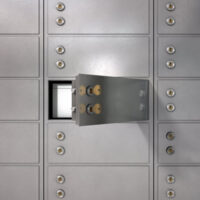Should You Use A Safety Deposit Box To Store Important Estate Planning Documents?

A safety deposit box offers a variety of advantages. But, even though these advantages are present, a safety deposit box also offers a number of disadvantages.
Being aware of these advantages and disadvantages, and speaking with an estate planning lawyer, will allow you to determine if using a safety deposit box is the right choice for you.
What Is A Safety Deposit Box?
A safety deposit box is a box that sits within a federally insured credit union or bank. Many different items can be stored within a safety deposit box, some of which are as follows:
- A birth certificate.
- Military records.
- A will.
- A house deed.
To ensure that these items are kept safe, every safety deposit box sits within a secure vault that often relies upon an elaborate set of unique security systems.
What Are The Advantages Of Using A Safety Deposit Box?
A safety deposit box offers a variety of advantages. Some of the most notable advantages of relying on a safety deposit box are as follows:
- A safety deposit box is designed to withstand natural disasters.
- A safety deposit box is guarded by an elaborate network of security systems.
- A safety deposit box sits within a secure vault.
Every single one of these advantages guarantees a measure of security that a standard safe, for example, may not be able to provide.
What Are The Disadvantages Of Using A Safety Deposit Box?
Even though a safety deposit box offers many advantages, they also offer a number of disadvantages. Some of the most notable disadvantages that can come from relying on a safety deposit box are as follows:
- You can only access a safety deposit box when the credit union/bank is open.
- None of the items stored within a safety deposit box are insured by the FDIC.
- You must continue to pay for your safety deposit box, or the items will be turned over to the state.
Every single one of these disadvantages can, and will, affect one’s experience with storing, and accessing, the items they place into a safety deposit box.
Should You Use A Safety Deposit Box To Store Important Estate Planning Documents?
The answer to this question is “It depends.”
Some people may find that the disadvantages are negligible and that using a safety deposit box to store important estate planning documents is the best possible choice.
Others may find that the advantages are not relevant to their situation and, as such, opt for a standard safe or another form of secure storage.
Regardless of what one chooses to do, there are three things to remember, when it comes to storing important estate planning documents:
- No matter the document, always make several copies.
- Do not store items that you may need in an emergency.
- Store at least one copy, of any estate planning document, at home.
Every single one of these recommendations will ensure that, even if the safety deposit box is inaccessible at that moment, there is another copy that can be used.
Speak With A Florida Estate Planning Lawyer Today
No matter the purpose of a particular document, if it involves your estate plan, then it must be kept safe and secure.
Speak with a Florida estate planning lawyer at the Millhorn Elder Law Planning Group today and we will assist you in developing an effective estate plan and come up with a strategy for storing these estate planning documents.
Sources:
investopedia.com/terms/s/safe-deposit-box.asp
law.cornell.edu/wex/fdic


